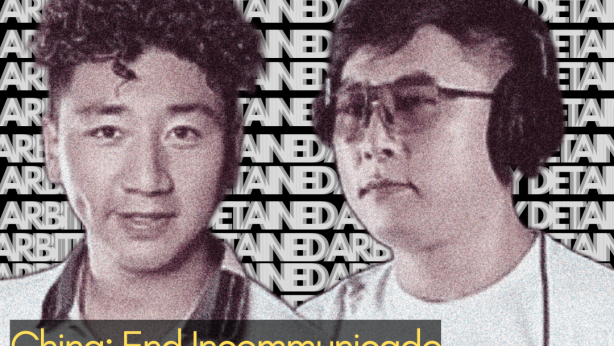TAR Propaganda Chief Stresses Protecting Official Secrets in Tibet
The propaganda chief of the Communist Party of China (CPC) Committee of Tibet Autonomous Region (TAR) has, in a speech at a seminar held on 11 July 2012 in the Tibetan capital Lhasa, emphasized the importance of ‘strengthening the concept of confidentiality, enhancing the sense of confidentiality, adherence to the discipline of confidentiality and to prevent the occurrence of leaking state secrets.'[i]
At the seminar attended by relevant officials and cadres working in bureaus and departments dealing with confidential official documents, Mr Dong Yunhu, the TAR Propaganda chief, called Tibet the ‘forefront’ of China’s ‘struggle against separatism’ and called for increased cultural system of propaganda and ideological work in protecting confidential information, citing incidents where the Tibetan area had become the main area for separatist forces inside and outside Tibet including ‘hostile forces’ and ‘foreign intelligence agencies’ to steal confidential information. In addition to the much touted call for maintaining ‘national stability’, Mr Dong also mentioned ‘cultural stability’ as one of the primary policy objectives in Tibet.
In an editorial dated 14 March 2012, the CPC mouthpiece People’s Daily noted that given China’s ethnic and cultural diversity, ‘enhancing the people’s identity of the mainstream culture and national identity on the basis of geographical and ethnic cultural development, is the primary task of today’s Chinese Communist Party in its cultural construction.'[ii]
Days after Mr Dong’s speech at the seminar, Li Changchun, the head of the Central Propaganda Department of the CPC, visited TAR particularly the farming and nomadic villages in Nyingtri (Chinese: Nyingchi) Prefecture from 17 to 21 July 2012. Mr Li met with cadres and officials as well as representatives of Tibet propaganda, ideological and cultural fronts and called for the efficient implementation of the Party’s policy in promoting leapfrog development and long-term stability. He also stressed on strengthening propaganda and cultural campaign to promote ‘ethnic unity’.
During his visit, Mr Li also called for cultivating ‘Five-Good’ when carrying out cultural propaganda work. The ‘Five Good’ according to Mr Li, are ‘Communist Party of China is good’; ‘Socialism is good’; ‘Nationalities is (are) good’; ‘Development is good’; and ‘Chinese Motherland is good’. He called for enhanced fight against separatism and protection of national unity and stability. He expressed hope that the’ radio and television project’ in Tibetan rural and nomadic households will accelerate the process of building a shared cultural service system for people of all ethnic groups in achieving reform and development.
On 18 July 2012, during his visit to Lhasa’s Jokhang Temple, Mr Li praised the implementation of ‘innovative projects’ such as the Nine-Must-Haves and The Six Ones in promoting the work of ‘advanced monasteries’.[iii] He called on the TAR Party Committee and government to further strengthen and promote the implementation of new monastic management regulations and to promote the long-term mechanism to make Tibetan Buddhism adapt to a socialist society.
In the last few months, the Chinese authorities in Tibet have aggressively pursued propaganda work in both monastic and lay communities, be it the implementation of ‘Nine-Must-Haves’ or ‘The Six Ones’ campaigns, rural ‘radio and television projects’, or the implementation real-name registration on the internet and the political education sessions.
One of the most provocative statements in recent years came from the current TAR Party chief Mr Chen Quanguo, who at the Second Plenary Session of the Eighth TAR CPC Committee on 26 June 2012, urged Party members to ensure that ‘the Party’s voices and images be heard across 1.2 million square kilometers of the vast territory’ of TAR and that “no voices and images of the hostile forces and Dalai clique can be heard and seen.'[iv]
Mr Chen’s call for a complete ban on any outside information in Tibet may also include ‘hostile forces’ such as Voice of America and Radio Free Asia radio networks which have become primary sources of outside information for Tibetans given the elaborate, intrusive censorship system in Tibet. In a survey[v] conducted by the Broadcasting Board of Governors (BBG) and Gallup among Tibetan pilgrims visiting India in December 2011 to January 2012, a whopping 89 percent said they considered any official Chinese state media outlet to be an unreliable news source, adding official TV channels are good only for entertainment purposes. Out of the 117 Tibetans questioned, 77 percent said they considered friends and family to be the most trustworthy way to hear about the world; 7 percent said they didn’t have any reliable news source; and 6 percent said foreign radio.
Restrictions on the internet including real-name registration online have also been stepped up with the Chinese authorities in TAR now calling for internet users to furnish ‘second-generation’ citizen ID card (Chinese: Shen Feng Teng) and ‘other documents’ to register at internet cafes.[vi] The new Shen Feng Teng carries more personal information about a person than its previous avatar making it easier for the authorities to control online activities. All Internet cafes in Lhasa have now been ordered to install the second -generation ID Card reader and Internet users without the new ID Card will not be allowed to register. Minors below the age of 18 are barred from using the internet and breaking this regulation would attract fines ranging from RMB 5,000 to 1,5000.
Endnotes:
[i] TAR Propaganda Chief Stresses Protection of Confidential Information http://tb.tibet.cn/2010news/xzxw/zzzj/201207/t20120713_1759996.html
[ii] Cultural Construction Is “The Spiritual Pillar” Of Social Stability http://english.peopledaily.com.cn/100668/102793/102810/7758310.html
[iii] Chinese Central Propaganda Chief at Jokhang Temple in Lhasahttp://news.hexun.com/2012-07-26/144027657.html
[iv] Second Plenary Session of the Eighth TAR Regional Party held in Lhasa http://epaper.chinatibetnews.com/xzrb/html/2012-06/27/content_367398.htm
[v] In Tibet, Word-of-Mouth Extends BBG’s Reach http://www.bbg.gov/press-release/in-tibet-word-of-mouth-extends-bbgs-reach/
[vi] Internet Cafe Users in Lhasa Must Hold a second-generation ID card for the full implementation of real-name registration system http://www.chinatibetnews.com/fazhi/2012-07/16/content_1015326.htm


